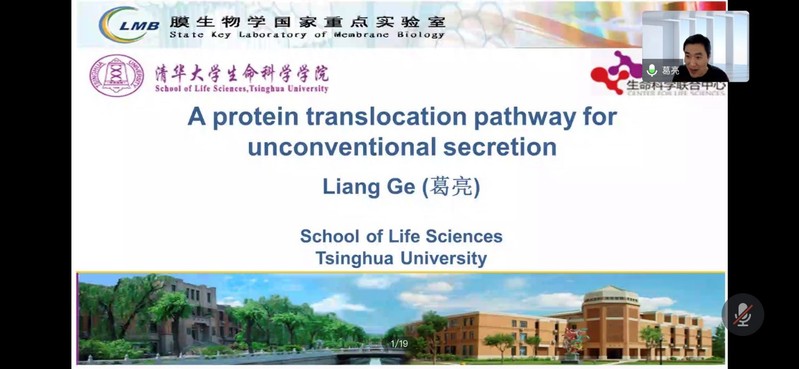At 1:30 pm on December 11, 2020, Professor Liang Ge from Tsinghua University was invited by the School of Life Science and Technology (SLST) at ShanghaiTech University to deliver a wonderful seminar online. The talk was entitled Protein Translocation and Unconventional Secretion, and the seminar was hosted by Professor Yanfen Liu of SLST.
Professor Liang Ge has been engaged in the research of vesicle trafficking and autophagy for a long time, and has published many papers in well-known journals. During his seminar, professor Ge first introduced the different types of protein secretory pathways, which include both the conventional and unconventional ones. For the conventional secretory pathway, cargos with a signal peptide first enter endoplasmic reticulum via the signal peptide recognition system, and then translocate to Golgi apparatus, where they are packed into vesicles ready to be delivered to the extracellular region. On the other hand, cargos that lacking a signal peptide (leaderless cargoes) are secreted through an unconventional secretion system. There are multiple types of unconventional secretion systems, among which the vesicle trafficking is a major pathway involved. However, it is unclear how leaderless cargoes enter the vesicle.
Recently, Professor Ge's laboratory has developed an elegant screening assay and identified TMED10 as a protein channel for the vesicle entry and secretion of many leaderless cargoes. Interesting, although having no signal peptide, the leaderless cargos present a relatively conservative motif, which can be recognized by the C-terminus of TMED10. The ERGIC (ER-Golgi Intermediate Compartment)-localized TMED10, which is a single transmembrane protein, becomes homo-oligomerized upon binding of leaderless cargo. And the oligomerized TMED10 may form a potential channel to mediate cargo translocation. They further verified that TMED10 directly mediates the membrane translocation of leaderless cargoes into the liposome, which is dependent on protein unfolding and enhanced by HSP90s in an in vitro recombination assay. Professor Ge's work thus depicts a new mechanism of how cell deals with the secretion of leaderless cargos. The speaker further discussed some interesting questions raised by the audience.

Brief introduction of Professor Liang Ge]
Professor Liang Ge was a postdoctoral fellow in Randy Schekman’s lab at University of California, Berkeley from 2011 to 2016, then was a Research Specialist in Schekman’s lab from 2016 to 2017, and became independent as an Assistant Professor at Tsinghua University since 2017.


